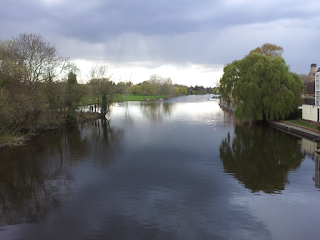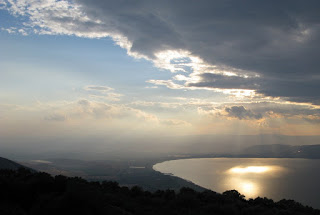 This article is based on a response I made on the Koinonia Life Discussion Forum.
This article is based on a response I made on the Koinonia Life Discussion Forum.There had been some discussion on the topic of 'unforgiveness' and this had brought us onto the related matter of judgement.
Here's what I contributed to the discussion, follwed by some further thoughts and Bible references.
What are your views on the topic? Perhaps things are not as clear cut as we sometimes think.
Leave a comment at the end of the article.
There's one place in particular where Jesus describes the judgement process - and it's not quite how most people imagine it.
Read Matthew 25:31-46, this is clearly about judgement.
Sheep and goats in Jesus' time looked pretty much alike. People who are 'in' and those who are 'out' look pretty much alike too. But, Good Shepherd that he is, Jesus separates and divides.
The interesting thing is that it has more to do with people's care for others than anything else. Had they fed the hungry, clothed the naked, invited in strangers? Of course, it's also about obedience - these are the very things we are commanded to do.
Verse 46 is pretty clear, our eternal destination depends on how much we cared for others.
Paul puts the emphasis on faith (eg Romans 3:22), and James on actions (James 2:14); though both agree that faith without actions is dead. Paul and Peter also agree that love is greater than faith (1 Corinthians 13:13, 1 Peter 4:8). John (1 John 4:8) tells us that the Almighty is love, and of course it's love that causes us to care for others.
Note that we can follow Jesus even if we don't know him. How can that be? Well, I think many who would not call themselves 'Christian' follow him by feeding the hungry, or inviting in strangers, for example. And we can fail to follow him even if we know him quite well. Are these the people who say 'Lord, Lord...' yet he says he doesn't know them?
And also note that it's what we did or did not do for the very least of these that is important here. We are called to have loving pity in our hearts for all who need, but especially for the weak, the helpless and the insignificant. We are called to be merciful. Read Matthew 5:3-12 because this passage is so closely related to the separation of the sheep and goats. 'Blessed are the merciful, for they will be shown mercy.'
As I was writing I saw an opening like a trapdoor. And I realised that there's only one door through which we may go up or down. But there is no place 'in between'. If we are not in the Kingdom of Heaven we are in the place of punishment and vice versa. Heaven and hell are not places we go to from here. They are surely places we are already in right now. The prodigal son's older brother is a good example, all his life he had done everything a good son should do, yet his heart was full of jealous bitterness rather than welcoming love. And he refused to go in (Luke 15:28).
Jesus always knew what was in a person's heart (Mark 2:8, Luke 5:22). And that is why he was able to say, 'You are not far from the Kingdom of Heaven', or, 'Truly, today you will be with me in Paradise'.
Finally, remember the wealthy man who asked Jesus how to obtain eternal life (Matthew 19:16-22). Jesus told him, 'Go and sell everything you have and give it to the poor, and then follow me'.
You might also like to read an earlier article on sheep and goats.























